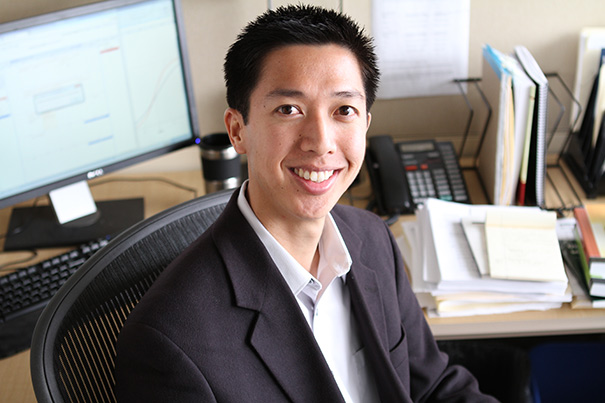
“The world of online education challenges us as instructors to make our teaching good enough to show to the entire world. But part of the HarvardX mission is to make sure that we are having an impact on our students on Harvard’s campus as well — this is not just about how we can distribute our lectures around the world but how we can improve our practice for our students here,” said Andrew Ho, research director of HarvardX.
Jill Anderson/Harvard Graduate School of Education
Fine-tuning online education
HarvardX research director discusses implications of new study
Andrew Ho, research director of HarvardX and an assistant professor at the Harvard Graduate School of Education (HGSE), spoke with the Gazette about a recent study that found that interspersing online lectures with short tests improved student performance. The practice cut student mind-wandering by half, tripled the rate of note-taking, and improved overall retention of the material, according to the research, published last week in the Proceedings of the National Academy of Sciences.
GAZETTE: In describing the study, senior author Daniel Schacter, the William R. Kenan Jr. Professor of Psychology, said there is “shockingly little” hard scientific data on how students learn online — how useful do you see this new study as being?
HO: Of course it’s incredibly important. Dan is a member of our HarvardX Research Committee, which is charged with coordinating and supporting the research mission of HarvardX, and research like this is one reason he’s on that committee, and one of the many ways he’s contributed to our discussions thus far.
It’s true that there are fewer scientific research findings in this field than one would expect, but that is rapidly changing, and it’s frankly our mission to change it. One of the challenges to this type of research is that it can be difficult to obtain large sample sizes, but the platform we have is beginning to change that. We are able to capture every mouse click with HarvardX, and that is an incredibly rich resource for research. It’s allowing us to address a number of questions that we hadn’t been able to address in the past, and Dan’s paper is an example of the type of work we want to facilitate.
GAZETTE: What was your reaction when you first saw the findings?
HO: I think the take-home point from this for our HarvardX research mission is the importance of experimental research. HarvardX is already incorporating the implications of Dan’s findings into its courses — we’re already interspersing assessments with lectures, but the key question is: How do we know if it is working? This type of controlled experimentation is the answer.
What Dan’s work allows us to say is that interspersing lectures with tests isn’t just associated with these outcomes — it actually caused them. It is the reason why mind-wandering decreased and note-taking increased. Without this type of rigorous experimentation, all we have is speculation. I think that’s the great opportunity that HarvardX affords, and it’s something that we are primed to take advantage of with people like Dan on the committee.
Dan is hoping to replicate this in the HarvardX world, and to ask questions about whether this result can be generalized to other courses or other topics, and whether this leads to greater learning outcomes, which is something we haven’t been able to test yet.
GAZETTE: There is still a perception that taking online classes is somehow less educationally valid than being in a brick-and-mortar classroom. Do you see this study as refuting that belief?
HO: This is a reminder that online learning is an active process, not a passive process. We are not watching television, we are not watching TED talks, and we are not watching YouTube videos. We are an active participant in a process that is challenging us, and forcing us to think and respond. What this paper shows is that active participation doesn’t just force us to move, it actually focuses us, and elicits behaviors that are associated with active learning.
GAZETTE: While this recent paper focuses on online education, researchers have said they would expect to see the same effect in in-person lectures. How do you see the best practices of the virtual classroom affecting real-world classrooms?
HO: The world of online education challenges us as instructors to make our teaching good enough to show to the entire world. But part of the HarvardX mission is to make sure that we are having an impact on our students on Harvard’s campus as well — this is not just about how we can distribute our lectures around the world but how we can improve our practice for our students here.
I think, in many ways, online education is about putting old pieces together in new ways, but what we find is that the whole is greater than the sum of the parts. We are engaging communities through online discussion forums, and by encouraging constant self-assessment. Students can see their progress is real-time and, as they’re sitting and watching a lecture, they can also track and measure their learning. As Dan’s work shows, this can be an incredibly motivating and active process.
There is as much a lesson here for our classrooms on campus — that if we can break up our presentation into assessable moments, it can improve students’ overall performance. The virtual classroom need not replace the real-world classroom as much as transform it — we can improve our practices by incorporating these new technologies and these new models of interaction. We are active participants, and what this paper shows is that by challenging us to do more than watch, but to think, we cannot help but learn.





